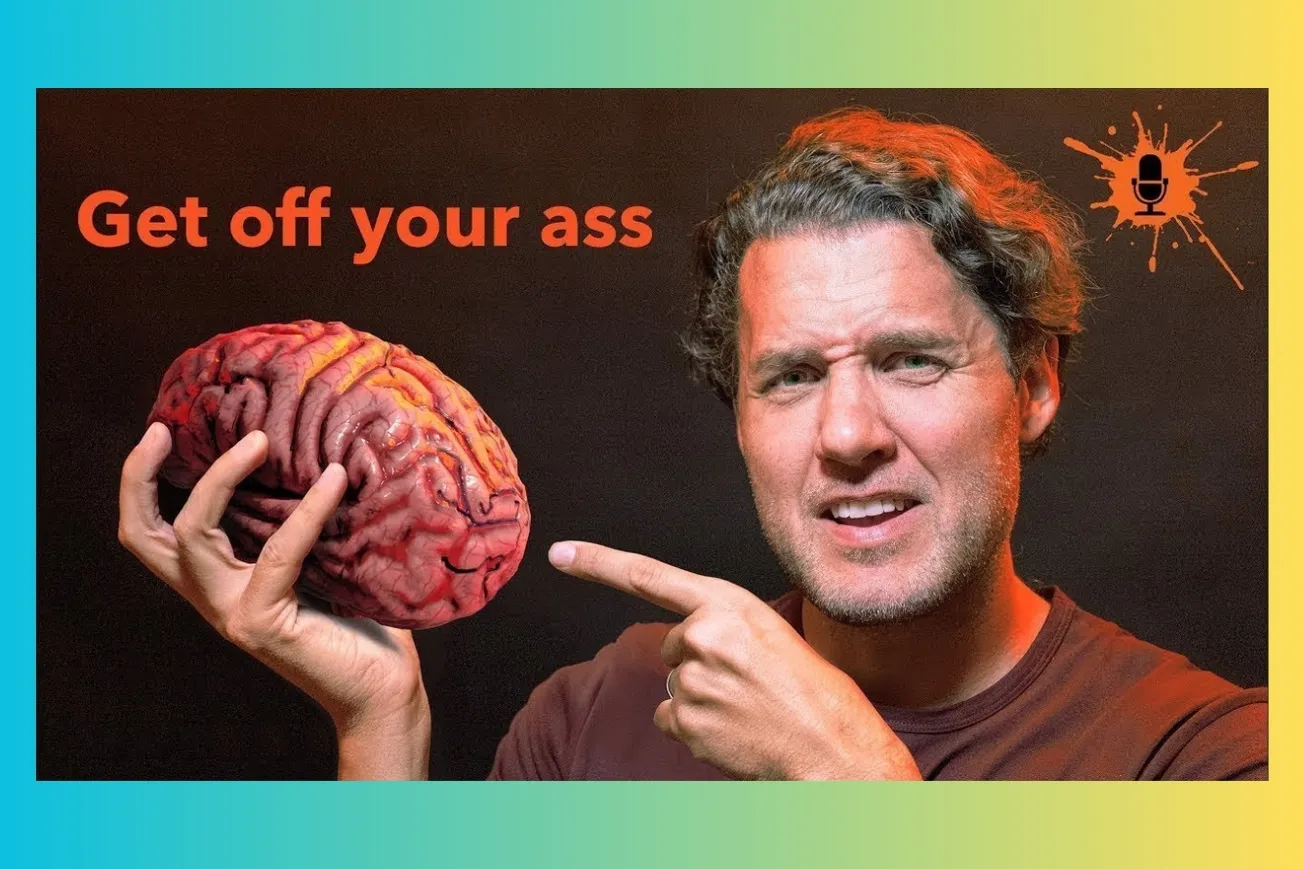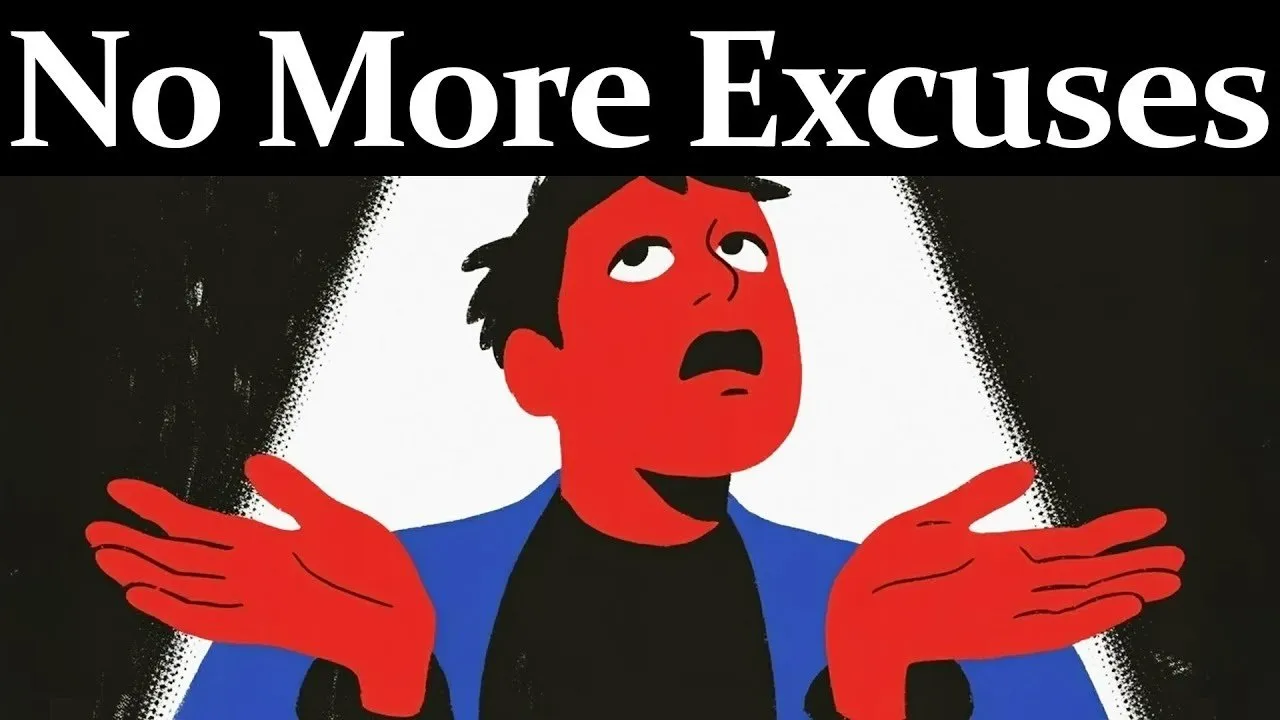Table of Contents
Discover Derek Sivers' insights on challenging assumptions and redefining success to truly reprogram your brain and approach life with a new perspective.
Key Takeaways
- Your internal monologue constantly shapes your reality; actively directing it is key to changing your life's direction and achieving personal success.
- Question deeply ingrained assumptions about success, happiness, and obligation – many are simply inherited ideas, not universal truths you must follow.
- Instead of seeking external validation, focus on intrinsic motivation and what truly resonates with your personal definition of a life well-lived.
- Embrace the "anti-goal" concept: clearly define what you don't want to become clearer about what you genuinely desire in life.
- Experiment with small, deliberate changes in your thinking patterns; consistent mental practice builds new neural pathways for lasting change.
- Real growth often comes from subtraction – removing limiting beliefs, unnecessary commitments, and societal pressures rather than adding more complexity.
- Pay attention to the information diet you consume, as it significantly influences your thoughts, beliefs, and ultimately, your actions.
- Treat life as a series of experiments; test your beliefs and assumptions against reality rather than holding them as rigid dogmas.
- Shift from a "have to" mindset to a "get to" mindset regarding challenges and responsibilities to cultivate gratitude and perspective.
Timeline Overview
- 00:00–15:00 — Introduction to the power of self-talk and questioning default assumptions. Derek Sivers discusses how easily we adopt societal norms without scrutiny and the importance of defining success on our own terms. Initial thoughts on how language shapes perception.
- 15:00–30:00 — Delving into mental models and practical techniques for shifting perspective. Sivers emphasizes the idea of "useful beliefs" over "true beliefs," suggesting we adopt frameworks that serve our goals, even if imperfect. Discussion on intrinsic vs. extrinsic motivation.
- 30:00–45:00 — Focus on action and experimentation. Sivers shares anecdotes about testing assumptions in his own life and business, highlighting the value of treating ideas as hypotheses rather than fixed truths. The concept of "subtracting" – removing limiting beliefs – is explored.
- 45:00–60:00 — Exploring the influence of environment and information diet on our thinking. Sivers stresses the importance of curating who and what you listen to, as external inputs constantly shape your internal landscape. He mentions, "Your mind is programmable, and the inputs matter tremendously."
- 60:00–End — Synthesizing the ideas: practical steps for ongoing mental reprogramming. Discussion revolves around consistency, patience, and the non-linear nature of personal growth. Sivers reflects on the long-term impact of consciously choosing one's mindset and avoiding reactive patterns.
Challenging Your Core Assumptions
- Much of what we believe about success, obligation, and the "right" way to live is inherited, not chosen. Sivers encourages listeners to actively dissect these foundational beliefs, asking why they hold them and whether they genuinely serve their desired life path. This isn't about rebellion for its sake, but about conscious construction of a personal philosophy.
- The language you use shapes your perception of reality. Shifting from phrases like "I have to" to "I get to" or "I choose to" can fundamentally alter your experience of daily tasks and challenges, replacing resentment with opportunity or agency. It’s a small linguistic tweak with significant psychological impact.
- Consider the source of your desires. Are they intrinsically motivated, stemming from genuine interest and personal values, or extrinsically driven by societal expectations, peer pressure, or the pursuit of status? Sivers argues that aligning actions with intrinsic motivations leads to more sustainable fulfillment.
- Actively seek out perspectives that contradict your own. This practice helps identify blind spots and prevents intellectual stagnation. It's uncomfortable but essential for genuine mental reprogramming and understanding the world more fully. Sivers suggests deliberately reading or listening to thinkers you disagree with.
- Your definition of "success" is malleable and should be defined by you. Don't blindly adopt external metrics like wealth, title, or recognition. Sivers advocates for defining success based on personal fulfillment, autonomy, contribution, or learning – whatever resonates most deeply.
- The feeling of "stuckness" often arises from unquestioned assumptions. By identifying the underlying belief causing the friction (e.g., "I must follow a linear career path"), you can begin to dismantle it and open up new possibilities for action and thought.
Questioning assumptions isn't a one-time event but an ongoing practice. It requires vigilance to notice when you're operating on autopilot, driven by beliefs you haven't consciously vetted or chosen. This continuous examination is central to reprogramming your mind.
The Power of Internal Monologue and Reframing
- Your internal narrative isn't just background noise; it actively creates your reality. Sivers emphasizes that by consciously directing your self-talk, you can change your emotional state, motivation levels, and ultimately, the actions you take. It's about becoming the scriptwriter, not just the actor reading lines.
- Reframing challenges as opportunities is a core technique. Instead of viewing a setback as a failure ("This proves I can't do it"), reframe it as a learning experience ("What can I learn from this? How can I adapt?"). This proactive reframing shifts you from a victim mindset to an active problem-solver.
- Useful beliefs versus true beliefs: Sivers suggests focusing on adopting mental models that are useful for achieving your goals, rather than getting bogged down in debates about absolute truth. A belief is useful if it empowers positive action and perspective, like believing you can improve with effort.
- "Is this useful?" becomes a powerful filtering question for thoughts and beliefs. When negative or limiting thoughts arise, asking this question can interrupt the pattern and prompt a search for a more constructive perspective. It shifts the focus from the thought's 'truth' to its function.
- Mental rehearsal shapes future outcomes. Visualizing successful navigation of challenging situations or practicing desired thought patterns strengthens those neural pathways, making it more likely you'll respond effectively when the situation actually occurs. It’s like practice for your brain.
- Sivers notes the cumulative effect: "Small, consistent adjustments in your thinking compound over time." Don't expect overnight transformation; focus on making slightly better mental choices each day, trusting that these accumulate into significant long-term change in your default programming.
Action, Experimentation, and Subtraction
- Ideas are cheap; execution and testing are where value lies. Sivers champions treating beliefs and strategies as hypotheses to be tested in the real world. Instead of debating endlessly, run small experiments to see what actually works for you in your context.
- Define your "anti-goals" – what you actively want to avoid becoming or experiencing. This clarity by contrast can be more motivating and easier to define than vague positive aspirations, providing clear boundaries for decision-making. Knowing what you don't want sharpens focus on what you do.
- Growth often involves subtraction, not just addition. This means actively removing limiting beliefs, shedding unhelpful identities, quitting projects that no longer serve you, and simplifying commitments. Clearing out the old makes space for the new, more aligned programming.
- Don't wait for perfect understanding or confidence before acting. Sivers suggests that action often precedes clarity and confidence. Taking small steps, even amidst uncertainty, generates feedback and learning that refines your approach and builds momentum.
- Documenting your thought experiments and their results can be incredibly valuable. Noting what mental frameworks you tried, how you applied them, and what the outcomes were provides concrete data for future adjustments, turning introspection into a more systematic process.
- Embrace being "wrong." A willingness to discard beliefs or strategies that prove ineffective is crucial for learning and adaptation. Seeing being wrong not as a personal failure but as a successful test outcome accelerates the reprogramming process.
Curating Your Information Diet
- The inputs you allow into your mind directly influence its programming. Sivers stresses the importance of being highly selective about the news, social media, books, podcasts, and even conversations you engage with. Consciously choose inputs that align with the mental state you want to cultivate.
- "You are the average of the five people you spend the most time with" extends to intellectual influences. Regularly consuming content from thinkers who embody the mindset you aspire to helps internalize their perspectives and thought patterns. Choose your influences deliberately.
- Be wary of outrage media and negativity bias. Constant exposure to negativity, fear, and conflict shapes your brain to expect and notice more of it. Limiting this type of input is crucial for maintaining a constructive and optimistic default mental state.
- Seek out timeless wisdom over fleeting trends. Sivers often refers to foundational philosophies and psychological principles that have stood the test of time, rather than chasing the latest self-help fads. Solid fundamentals provide a more stable base for mental reprogramming.
- Vary your information sources to avoid echo chambers. Deliberately exposing yourself to different viewpoints, even ones you disagree with, strengthens your critical thinking and prevents your beliefs from becoming rigid dogma. It helps you understand why you believe what you believe.
- Practice mindful consumption. Don't just passively absorb information; engage with it critically. Ask questions: Is this useful? Is it true? How does it fit with my goals and values? Does it empower me or drain me? Active filtering is key.
Redefining Success and Fulfillment
- Success is not a monolithic concept defined by society; it's a personal construct. Sivers consistently argues for defining success on your own terms, whether that means creative fulfillment, autonomy, deep relationships, continuous learning, or simply peace of mind. Detach from external scorecards.
- Focus on the process, not just the outcome. Finding satisfaction and engagement in the doing – the daily practice, the learning, the problem-solving – leads to more sustainable fulfillment than solely chasing external milestones, which often feel anticlimactic.
- Intrinsic motivation is more powerful and sustainable than extrinsic rewards. Aligning your work and life with activities you find genuinely interesting or meaningful provides a deeper wellspring of energy and resilience than pursuing money, fame, or status for their own sake.
- Sivers shares his own journey as an example: "I optimized my life for happiness and autonomy, not income." This meant making counter-intuitive choices like selling CD Baby for less than he might have, prioritizing freedom and creative control over maximizing profit.
- Regularly reassess your definition of success. What fulfilled you five years ago might not be what drives you today. Periodically check in with yourself to ensure your goals and definition of a "good life" are still aligned with your current values and aspirations.
- Contribution can be a powerful component of fulfillment. Thinking about how your actions or creations help others can provide a strong sense of purpose that transcends purely personal achievement. This doesn't have to be grand; small acts of usefulness matter.
Practical Techniques for Mental Shifts
- Use pattern interrupts for negative thoughts. When you catch yourself in a destructive thought loop, have a pre-planned action to break the cycle – stand up, change environment, ask "Is this useful?", recall a positive memory, or engage in brief physical activity.
- Implement "if-then" planning for anticipated challenges. For example: "If I start feeling overwhelmed by my inbox, then I will close it and take five deep breaths." This pre-commitment makes it easier to manage difficult situations proactively.
- Practice gratitude journaling, specifically focusing on why you're grateful. Moving beyond simple listing to articulating the reasons deepens the positive emotional impact and trains your brain to notice the good more readily.
- Schedule time for reflection. Sivers emphasizes the importance of stepping back from the "doing" to process experiences, review decisions, and consciously adjust mental models. This could be daily journaling, weekly reviews, or longer periodic retreats.
- Engage in deliberate practice for mental skills. Just like learning an instrument, improving focus, reframing, or managing emotions requires consistent, targeted effort. Identify the mental skill you want to build and create small exercises to practice it regularly.
- "What would [role model] do?" Use inspiring figures as mental shortcuts. When facing a tough decision or negative state, asking how someone you admire for their mindset would handle it can provide immediate perspective and alternative options.
Reprogramming your brain requires consistent, deliberate effort, much like physical training. These techniques provide concrete ways to actively shape your thinking patterns over time.
Success is less about achieving external validation and more about aligning your life with your own consciously chosen values and definition of fulfillment. True mental reprogramming allows you to architect a life that genuinely resonates with who you are and what you want to contribute.





